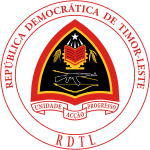Indonesia–Timor Leste Commission of Truth and Friendship
| History of East Timor |
|---|
 |
| Chronology |
|
| Topics |
|
|
The Indonesia–Timor Leste Commission on Truth and Friendship (more commonly known by its Portuguese acronym CVA, Comissão Verdade e Amizade) was a
Background
East Timor was originally colonized by the Portuguese, and remained a colony up until the
Indonesia occupied the territory for the following two decades. During the administration of the
Report
The commission itself was announced in August 2006 and sought to establish "the conclusive truth regarding human rights violations to have occurred prior to, immediately after the Popular Consultation on 30 August 1999" as well as "prepare recommendations that can contribute to healing wounds of the past and strengthen friendship".[8] The timing of the commission's creation was criticized by some, as it was believed that it was created to intentionally subvert calls for an international tribunal to deal with the events surrounding the 1999 plebiscite. The commission's mandate allowed it to review documents pertaining to four other inquiries surrounding the events that predated it: "The Indonesian National Commission of Inquiry on Human Rights Violations in East Timor in 1999", "The Indonesian Ad Hoc Human Rights Court on East Timor", "The Special Panels for Serious Crimes", and "The Commission for Reception, Truth and Reconciliation".[9]
The commission was made up of four members appointed from each nation, and these commissioners were instructed to conduct a document review and analyze previous trials and investigations into the subject, including the UN Special Panels for Serious Crimes and Serious Crime Units in Dili, and the report of the Commission of Reception, Truth and Reconciliation of Timor-Leste.[10] The commission also stated its intent to research the "historical background, political dynamics, and institutional structures that shaped events before and during 1999" to "inform its conclusions with a broader understanding of the way in which the causes of the violence in 1999 were connected to previously established institutional structures and practices."[11]
Operating over three years, the commission gave its final report on July 15, 2008, and presented it to the Presidents of Indonesia and East Timor, concluding that "gross human rights violations in the form of crimes against humanity did occur in East Timor in 1999" and that "pro-autonomy militia groups, TNI, the Indonesian civil government, and Polri must all bear institutional responsibility", as well as stating that "from a moral and political perspective the respective states must accept state responsibility for the violations identified in the report."[12] The commission also made recommendations that both nations begin institutional reform enhancing the strength of investigative and prosecuting bodies involved with investigations into the events, as well as forming joint security policy to ensure the safety of individuals in case of the recurrence of violence. It also noted the need to resolve other standing border and security issues between the two nations to allow for more cooperation. Notably, the report gave no recommendations of amnesty or rehabilitation. The report was endorsed by the president of Indonesia, Susilo Bambang Yudhoyono, making it the first recognition of the Indonesian government's complicity in human rights violations in East Timor by Indonesia.
Reception
In Indonesia and Timor, the report was presented to both governments and accepted by both the Timorese and Indonesian governments. However, Timorese
Internationally, the report had a mixed reception. Some, such as the War Crimes Studies Center at the University of California, Berkeley, said that the commission could be seen as "widely acknowledged as credible and far-reaching.", noting that the Indonesian government's affirmation of the results was important and that the commission made arguments that "there was credible evidence to indicate that Timorese institutions were also responsible for illegal detentions and possibly other crimes."[14]
See also
- History of East Timor
- Commission for Reception, Truth and Reconciliation in East Timor
- Indonesian occupation of East Timor
- Santa Cruz massacre
References
- ^ Hayner, Priscilla (2011). Unspeakable Truths: Transitional Justice and the Challenge of Truth Commissions. New York: Routledge. p. 64.
- ^ "East Timor Truth Commission". University of California Berkeley. Archived from the original on 4 March 2016. Retrieved 6 October 2013.
- ^ Hayner, Priscilla (2011). Unspeakable Truths: Transitional Justice and the Challenge of Truth Commissions. New York: Routledge. p. 65.
- ^ Dunn, James (2003). East Timor: A Rough Passage to Independence. New South Wales, Australia: Longueville Media. p. 95.
- ^ Dunn, James (2003). East Timor: A Rough Passage to Independence. New South Wales, Australia: Longueville Media. p. 199.
- ^ Dunn, James (2003). East Timor: A Rough Passage to Independence. New South Wales, Australia: Longueville Media. p. 349.
- ^ Dunn, James (2003). East Timor: A Rough Passage to Independence. New South Wales, Australia: Longueville Media. p. 353.
- ^ "Per Memoriam Ad Spem" (PDF). Archived from the original (PDF) on 1 January 2014. Retrieved 21 October 2013.
- ^ "An Unfinished Truth: An Analysis of the Commission of Truth and Friendship's Final Report on the 1999 Atrocities in East Timor" (PDF). International Center for Transitional Justice. Retrieved 22 October 2013.
- ^ "Per Memoriam Ad Spem" (PDF). Archived from the original (PDF) on 1 January 2014. Retrieved 10 November 2013.
- ^ "Per Memoriam Ad Spem" (PDF). Archived from the original (PDF) on 1 January 2014. Retrieved 10 November 2013.
- ^ "Per Memoriam Ad Spem" (PDF). Archived from the original (PDF) on 1 January 2014. Retrieved 21 October 2013.
- ^ "An Open letter in response to the CTF report" (PDF). Timor-Leste National Alliance for International Tribunal. Retrieved 11 November 2013.
- ^ "East Timor Truth Commission". University of California, Berkeley. Archived from the original on 4 March 2016. Retrieved 11 November 2013.
